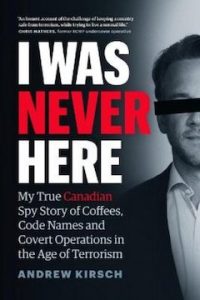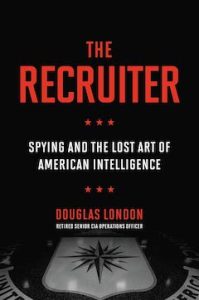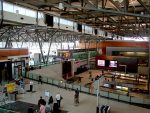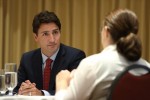Canadians and Americans are similar, but different. To see this obvious statement in practical terms, two books – by two authors who will speak in Vancouver next month – provide an entertaining and educational contrast.
Andrew Kirsch and Douglas London are retired spies. Well, the term “spy” is, they both readily admit, a bit laden for a job that Kirsch characterizes as a lot of “hurry up and wait” and that London describes as “hours and hours of routine, and a few moments of adrenaline.”
Kirsch is a Canadian and author of I Was Never Here: My True Canadian Story of Coffees, Codenames and Covert Operations in the Age of Terrorism. London is American and author of The Recruiter: Spying and the Lost Art of American Intelligence. They will present as part of the Cherie Smith JCC Jewish Book Festival, in an event dubbed “Jews in Trench Coats,” on Feb. 13.
Kirsch, who grew up in Toronto, left a job in the financial sector in London, England, after the 2005 terror attacks in that city and joined the Canadian Security Intelligence Services, CSIS. He describes himself as “part of a post-9/11 wave of civically minded Canadians who had left our day jobs to do our part in the age of terrorism.”
London’s career in the field was longer, symmetrically spanning 17 years on either side of 9/11, which is, obviously, the Western world’s iconic intelligence failure of the current era.
In the United States, the FBI is the domestic security service, much like our RCMP, while the CIA works almost exclusively outside the country. Similarly, in Israel, the Mossad deals with foreign intelligence and covert activities, while Shin Bet manages internal security. “In Canada, we have one organization [CSIS], and it’s responsible for covering the globe while operating largely domestically,” writes Kirsch.
 The lack of awareness around CSIS is one of the reasons Kirsch wrote his book. If the CIA knocks on your door, many people around the world would know to be instantly on alert. If CSIS knocks on a Canadian’s door, Kirsch admits, it usually requires a quick spiel about what CSIS is and what it does. He also wrote the book because, when he and most of the other agents he knows first got interested, there was little to read on the subject of what they might expect.
The lack of awareness around CSIS is one of the reasons Kirsch wrote his book. If the CIA knocks on your door, many people around the world would know to be instantly on alert. If CSIS knocks on a Canadian’s door, Kirsch admits, it usually requires a quick spiel about what CSIS is and what it does. He also wrote the book because, when he and most of the other agents he knows first got interested, there was little to read on the subject of what they might expect.
If most Canadians don’t know what CSIS is, new Canadians can be expected to know even less. The author shares a cute anecdote about how he shorthands his role for Arabic speakers.
“The Arabic term for intelligence service is Mukhābarāt,” he writes. Obviously, somebody from an Arabic speaking country might understandably be anxious when someone knocks on the door and declares themselves representatives of the security service.
“I’d simply say, ‘Canadian Mukhābarāt. Nice Mukhābarāt.’ That might get a laugh and a foot in the door,” he said.
In typical Canadian fashion, Kirsch downplays the drama. He’s no James Bond.
“These aren’t high-stakes negotiations over baccarat and cocktails at a casino. It’s much less glamorous. I was in the coffee and conversations business,” he writes. Nevertheless, he charms with amusing anecdotes, foibles and practical jokes (he and his former colleagues are serious and professional, he insists, but they need to blow off steam). One gets to know the man and the organization.
While Kirsch is modest in speaking of his work and that of CSIS, he makes their significance clear.
“Canada is one of the safest countries in the world. This is not because we don’t face threats, but because we do an admirable job of protecting our citizens against them,” he writes. “That is how law enforcement and intelligence agencies tend to work. If we do our job, you won’t know we were ever needed in the first place.”
One of the most notable incidents in recent history when the work of CSIS did hit the front pages was the foiled Toronto 18 plot in 2006, when a cadre of radicalized Canadians plotted to explode truck bombs in southern Ontario. That was a disaster that didn’t happen because of intelligence, but Kirsch acknowledges tragedies where intelligence failed.
In 2014, for example, Michael Zehaf-Bibeau shot and killed Cpl. Nathan Cirillo, a soldier who was standing guard at the National War Memorial, and then stormed Parliament Hill but was killed before he could reach the heart of our democracy.
And just because Canadians have been blessedly fortunate not to suffer more terrorism doesn’t mean Canadians aren’t involved in some of the horrors we see abroad. A Vancouverite was convicted in absentia for involvement in a suicide bomb attack on Israeli tourists in Burgas, Bulgaria, in 2012. Five Israelis and the bus driver were killed and more than 35 other Israelis injured.
Kirsch admits he was worn down by the bureaucracy of the job, but his decision to leave the agency was based on family obligations, when his wife became pregnant. He clearly holds CSIS and his former colleagues in great esteem.
London’s reflections are not so kind. He calls the CIA in the last couple of decades “a cult of personality.”
“The senior ranks became an ever more homogenous collection cut from the same mold, focused more on ambition than the mission, the organization, or the workforce,” writes London. “While there were thankfully brilliant exceptions, the cadre had drunk their own Kool-Aid as to their own brilliance and worth.”
 London also paints a more dramatic picture than his Canadian counterpart – not surprising, given the lopsided size and prominence of their respective organizations in the world.
London also paints a more dramatic picture than his Canadian counterpart – not surprising, given the lopsided size and prominence of their respective organizations in the world.
There is cajoling involved in recruiting people to the CIA. One of the crucial tasks of a successful operations officer is determining a person’s motivations. To one potential recruit, London said, “It was Allah’s will that we meet … so we can together accomplish something bigger than ourselves.” In this case, it was an appeal to religious and national pride, not material reward. In other cases, material reward was enveloped in a person’s (usually a man’s) sense of providing for family, in which case London would emphasize that the “ability to contribute modestly to your family’s well-being” was something that would be undertaken by a good family man, not a traitor to his country.
London writes about antisemitism he encountered from among colleagues – especially fellow recruits early in his career, many of whom had never met a New Yorker, let alone a Jew. Both authors write of keeping their Jewishness under the radar. Occasionally, a throwaway comment could still stun.
Kirsch was meeting with a Sunni Muslim who was ranting about his hatred of Shia Muslims.
“And he rolled back into his seat and he stroked his big bushy beard and said, ‘You know, Andrew, they are worse than the Jews.’
“I don’t think I’ve ever felt more Jewish than in that moment,” writes London.
In an amusing observation near the end of his book, London claims people in his business are notorious yentas.
“It’s a pity really that confidentiality considerations prevent the creation of a People magazine, Us Weekly or TMZ program for the agency. Perhaps ironic, but the very same people hired to protect our nation’s most guarded national secrets are absolutely the biggest gossips.”
London proves this in a book that is as juicy as CIA censors would allow.
Jews in Trench Coats, featuring London and Kirsch, takes place at 6 p.m., Monday, Feb. 16. Tickets are $18. The JCC Jewish Book Festival runs Feb. 11-16, with free and ticketed events for all ages. Details at jccgv.com/jewish-book-festival.


